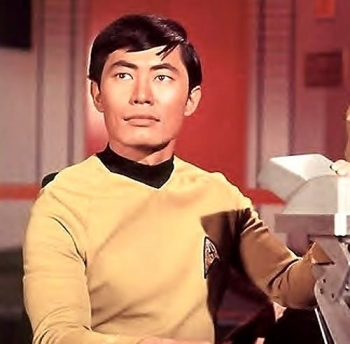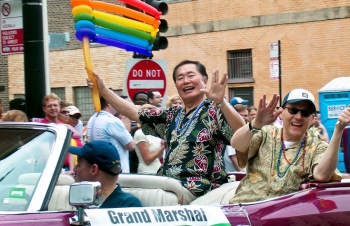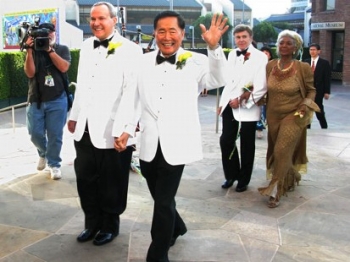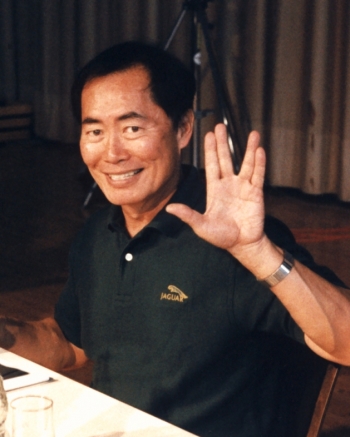Calling all Trekkies!
If you’re a fan of the original Star Trek TV series (and movies), then you’ll be familiar with the jet black hair and yellow ocher bodysuit of Hikaru Sulu. No, I’m not about to dive into Buddhist teachings in Star Trek, but rather focus on the man who portrayed Sulu: Japanese American actor George Takei.
George Hosato Takei was born in Los Angeles on 20 April 1937, and spent part of his childhood in the internment camps for Japanese Americans that were set up during World War II. When his family returned to LA, Takei’s aptitude for acting was evident—“Every grammar school skit, junior high drama club, and high school play became a stepping stone to realizing his not-so-secret dream of becoming an actor.” (georgetakei.com) Graduating from Los Angeles High School in 1956, he went on to study at the University of California, Berkeley, and later transferred to UCLA, where he graduated with a BA and MA in Theater Studies. As a student, Takei was also known to visit the Berkeley Buddhist Temple.
Takei’s acting career began in 1957 with a Japanese science fiction film, Rodan. He also acted in the drama series Playhouse 90 and motion picture Ice Palace, before rising to prominence as Sulu in Star Trek. Takei’s career demonstrates variety and talent. From television series to programs on Nickelodeon, his acting ability was tested on all fronts.
George Takei’s father practiced Zen Buddhism, and his mother was a devotee of Shin. Although neither was very devout, his mother made a small altar at the back of their barrack room in the internment camp. Religion only came to the fore when they left the camp, and Takei and his siblings were taken to the Senshin Buddhist Temple in LA and attended Sunday School there. The young couple who taught Sunday School, Roy and Terry Nakawatase, made a strong impression on him. Roy once said something about the ocean that had a particular impact: “I remember Roy using the metaphor of the vastness of the ocean: we are all part of it, we belong to this vast oneness, and that made a lot of sense for me—that I am really one with everybody, with the whole, and that we can play a part in making that whole healthier and more understanding.” (The Huffington Post)
In 2008, Takei married his long-time partner Brad Altman (now Takei), when the Supreme Court of California ruled in favor of marriage equality. Takei was an avid runner, and it was at a running club, the LA Frontrunners, that he met Altman. They kept their relationship secret for 18 years, until Takei came out publicly in 2005. Altman had also become Buddhist by then, and they had a Buddhist wedding, which Takei describes in an article in Lion’s Roar: “We chose Rev. Briones of the Nishi Hongwanji Temple to be our officiant because he personifies Buddhism’s diversity, being that he’s a Mexican American Buddhist minister. . . . It was a joyous occasion, a very diverse one, and singularly a Buddhist wedding.”


















